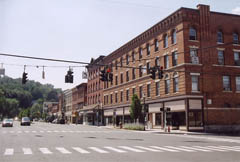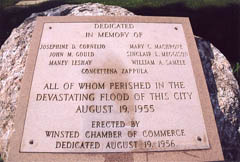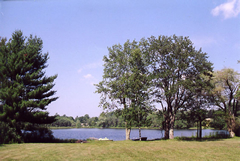August 1, 2013 --
Not a summer goes by when I do not think of Camp Wabigoon for boys, Camp Wahanda for girls.
I began at Camp Wabigoon as a 7- year old freshman, in 1947 when gas cost about 23 cents a gallon, and the average income was about $3500; and ended my Wabigoon summers as a 21-year old counselor in 1961, when gas was about 30 cents a gallon and the average income was about $5300.
The Wabigoon/Wahanda summer began on July 1 and ended on August 26.
The camps were located on Spencer Hill Road, above Winsted, Connecticut. We took the train to Winsted, in 1947 and 1948, and switched to buses for the 1948 trip home, and thereafter.
Dew on the grass in the morning, deep blue skies with white fluffy clouds during the day, three rolling hills to the north, star-filled skies at night Softball, basketball, volley ball, swimming in Rowley's Pond, tennis, handball, arts and crafts, learning lines for the Saturday night plays, during the day. Campfires, Spell-It-Out, boxing, movies, social among the evening activities.
 |
A
view down Main Street in Winsted. |
 |
Memorial
to the victims of the Flood of 1955. |
|
 |
The
Camp Wabigoon waterfront on Rowley's pond as seen from
left field on the old Wabigoon softball field. A fly ball
in the lake was usually a home run (unless, in going around
the bases, the runner missed second, as this writer once
did--the one time he hit a ball into the lake.) |
Six ounce bottles of Coca Cola for a nickel; the delicious ice cream from Torrington Creamery. MIlk and cookies after rest period. Trips to see movies in Winsted, the Boston Symphony in Tanglewood, the American Shakespesare Festival. Towards the end of the 1955 season, the walk to see Winsted after it was devastated by hurricane-caused flooding.
The camps were established in the early 1930's by the Brandstein family and continued up to the early 1970s. (Memorial thanks to Gadys and Phil Brandstein for making Wabigoon and Wahanda possible.) This would be the time of summer when counselors would be writing mid-season reports to send to the parents of our charges. The summer's first camp-wide activity was the Fourth of July trackmeet. Usually the day after the "Big Show", Color War would break out (about August 16 or so,) with the banquet and burning of the CW on August 24.
Just some random thoughts of summers past -- thoughts that suggest "nostalgia" means never having to say "I'm moving on."
NOTE: Photos from the LPR Archives, July 17, 2005.

|
|



